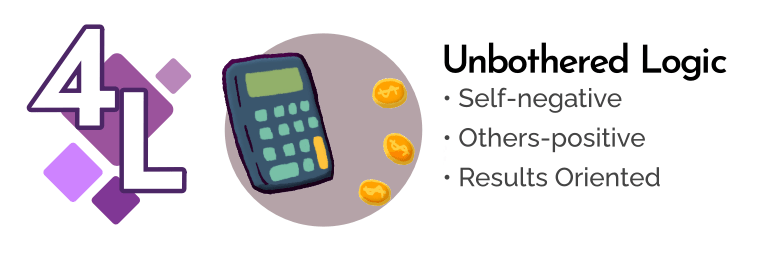
The 4L attitude is characterized by a self-negative (Ls-) and others-positive (Lo+) disposition. This disposition creates an attitude that is unconcerned of how the realm of logic may affect them. 4Ls come to an understanding that outside sources have a better grasp over the aspect. The 4L feels a sense of ease regarding logic, and generally desires quick conclusions when they are forced to produce opinions in this realm. The strategies that each 4L employs may differ in behavior or execution but the core attitude of unbothered acceptance of outside information regarding logic will be consistent and true for all 4Ls. Below are some common beliefs and behaviors that you may see with 4Ls. Please keep in mind that these are generalities and do not represent the vast sub-archetypes held within the overall 4L attitude.
Dichotomies
Uncertain • Insufficient • Weak • Passive • Objective • Fearless • Flippant • Local • Distinct
Personally Unbothered
• Easygoing and open to others’ points of view.
•Not overly interested in the meaning of life unless it’s relevant to their current activities.
• Can cut logically detailed conversations short if clear answers to problems are not gained.
• May depend on previous objective intellectual thought and ideas to figure things out.
• Are not overly motivated by academic success.
• Don’t tend to spend much time creating their own rules and systems to apply to reality but will gladly listen to others.
• Prefer to quickly diagnose a reason to answer a “why” question.
• May get annoyed if people pressure them to explain complex logical underpinnings.
• Zone out when conversations expect them to actively engage in epistemology, philosophy and science as they prefer to listen.
• May think they have nothing logical to add regardless of their actual level of knowledge.
• Prefer cut and dry answers to intellectual problems rather than philosophizing endlessly.
• Have a high tolerance for being corrected or constructively criticized in academia.
Connoisseurs of Logic
• Trust that other people have spent the appropriate time proving a point, which in their mind makes it more valid.
• Do not mind being around self-assured intellectuals and will defer to them for answers rather than producing answers themselves.
• Prefer to look to others in order to understand theoretical information.
• Are stellar connoisseurs of finding those who are academically gifted.
• Can traverse multiple arenas of logic in order to find what is the most effective and efficient methodology.
In Practice
• Easygoing and neutral about their opinions of higher knowledge, political arguments, scientific thought and their own abilities to reason.
• Focuses intently on the results that can be obtained from logical analysis, though this is not a top priority for them.
• Trusts in the feedback that they receive from others when inquiring in all matters related to logic.